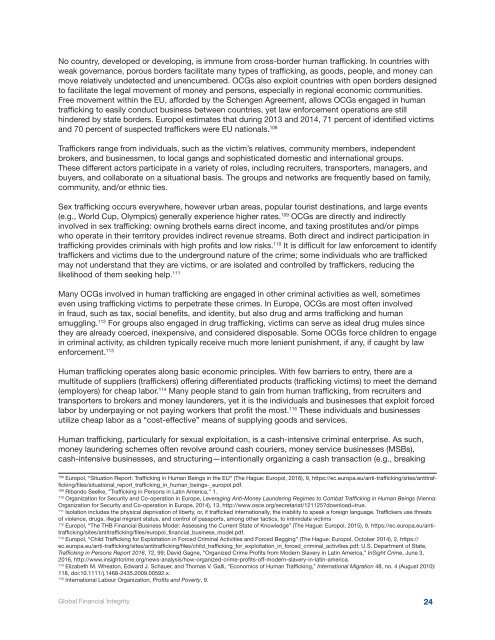Transnational Crime and the Developing World
Transnational_Crime-final
Transnational_Crime-final
Create successful ePaper yourself
Turn your PDF publications into a flip-book with our unique Google optimized e-Paper software.
No country, developed or developing, is immune from cross-border human trafficking. In countries with<br />
weak governance, porous borders facilitate many types of trafficking, as goods, people, <strong>and</strong> money can<br />
move relatively undetected <strong>and</strong> unencumbered. OCGs also exploit countries with open borders designed<br />
to facilitate <strong>the</strong> legal movement of money <strong>and</strong> persons, especially in regional economic communities.<br />
Free movement within <strong>the</strong> EU, afforded by <strong>the</strong> Schengen Agreement, allows OCGs engaged in human<br />
trafficking to easily conduct business between countries, yet law enforcement operations are still<br />
hindered by state borders. Europol estimates that during 2013 <strong>and</strong> 2014, 71 percent of identified victims<br />
<strong>and</strong> 70 percent of suspected traffickers were EU nationals. 108<br />
Traffickers range from individuals, such as <strong>the</strong> victim’s relatives, community members, independent<br />
brokers, <strong>and</strong> businessmen, to local gangs <strong>and</strong> sophisticated domestic <strong>and</strong> international groups.<br />
These different actors participate in a variety of roles, including recruiters, transporters, managers, <strong>and</strong><br />
buyers, <strong>and</strong> collaborate on a situational basis. The groups <strong>and</strong> networks are frequently based on family,<br />
community, <strong>and</strong>/or ethnic ties.<br />
Sex trafficking occurs everywhere, however urban areas, popular tourist destinations, <strong>and</strong> large events<br />
(e.g., <strong>World</strong> Cup, Olympics) generally experience higher rates. 109 OCGs are directly <strong>and</strong> indirectly<br />
involved in sex trafficking: owning bro<strong>the</strong>ls earns direct income, <strong>and</strong> taxing prostitutes <strong>and</strong>/or pimps<br />
who operate in <strong>the</strong>ir territory provides indirect revenue streams. Both direct <strong>and</strong> indirect participation in<br />
trafficking provides criminals with high profits <strong>and</strong> low risks. 110 It is difficult for law enforcement to identify<br />
traffickers <strong>and</strong> victims due to <strong>the</strong> underground nature of <strong>the</strong> crime; some individuals who are trafficked<br />
may not underst<strong>and</strong> that <strong>the</strong>y are victims, or are isolated <strong>and</strong> controlled by traffickers, reducing <strong>the</strong><br />
likelihood of <strong>the</strong>m seeking help. 111<br />
Many OCGs involved in human trafficking are engaged in o<strong>the</strong>r criminal activities as well, sometimes<br />
even using trafficking victims to perpetrate <strong>the</strong>se crimes. In Europe, OCGs are most often involved<br />
in fraud, such as tax, social benefits, <strong>and</strong> identity, but also drug <strong>and</strong> arms trafficking <strong>and</strong> human<br />
smuggling. 112 For groups also engaged in drug trafficking, victims can serve as ideal drug mules since<br />
<strong>the</strong>y are already coerced, inexpensive, <strong>and</strong> considered disposable. Some OCGs force children to engage<br />
in criminal activity, as children typically receive much more lenient punishment, if any, if caught by law<br />
enforcement. 113<br />
Human trafficking operates along basic economic principles. With few barriers to entry, <strong>the</strong>re are a<br />
multitude of suppliers (traffickers) offering differentiated products (trafficking victims) to meet <strong>the</strong> dem<strong>and</strong><br />
(employers) for cheap labor. 114 Many people st<strong>and</strong> to gain from human trafficking, from recruiters <strong>and</strong><br />
transporters to brokers <strong>and</strong> money launderers, yet it is <strong>the</strong> individuals <strong>and</strong> businesses that exploit forced<br />
labor by underpaying or not paying workers that profit <strong>the</strong> most. 115 These individuals <strong>and</strong> businesses<br />
utilize cheap labor as a “cost-effective” means of supplying goods <strong>and</strong> services.<br />
Human trafficking, particularly for sexual exploitation, is a cash-intensive criminal enterprise. As such,<br />
money laundering schemes often revolve around cash couriers, money service businesses (MSBs),<br />
cash-intensive businesses, <strong>and</strong> structuring—intentionally organizing a cash transaction (e.g., breaking<br />
108<br />
Europol, “Situation Report: Trafficking in Human Beings in <strong>the</strong> EU” (The Hague: Europol, 2016), 9, https://ec.europa.eu/anti-trafficking/sites/antitrafficking/files/situational_report_trafficking_in_human_beings-_europol.pdf.<br />
109<br />
Rib<strong>and</strong>o Seelke, “Trafficking in Persons in Latin America,” 1.<br />
110<br />
Organization for Security <strong>and</strong> Co-operation in Europe, Leveraging Anti-Money Laundering Regimes to Combat Trafficking in Human Beings (Vienna:<br />
Organization for Security <strong>and</strong> Co-operation in Europe, 2014), 13, http://www.osce.org/secretariat/121125?download=true.<br />
111<br />
Isolation includes <strong>the</strong> physical deprivation of liberty, or, if trafficked internationally, <strong>the</strong> inability to speak a foreign language. Traffickers use threats<br />
of violence, drugs, illegal migrant status, <strong>and</strong> control of passports, among o<strong>the</strong>r tactics, to intimidate victims<br />
112<br />
Europol, “The THB Financial Business Model: Assessing <strong>the</strong> Current State of Knowledge” (The Hague: Europol, 2015), 9, https://ec.europa.eu/antitrafficking/sites/antitrafficking/files/europol_financial_business_model.pdf.<br />
113<br />
Europol, “Child Trafficking for Exploitation in Forced Criminal Activities <strong>and</strong> Forced Begging” (The Hague: Europol, October 2014), 2, https://<br />
ec.europa.eu/anti-trafficking/sites/antitrafficking/files/child_trafficking_for_exploitation_in_forced_criminal_activities.pdf; U.S. Department of State,<br />
Trafficking in Persons Report 2016, 72, 99; David Gagne, “Organized <strong>Crime</strong> Profits from Modern Slavery in Latin America,” InSight <strong>Crime</strong>, June 3,<br />
2016, http://www.insightcrime.org/news-analysis/how-organized-crime-profits-off-modern-slavery-in-latin-america.<br />
114<br />
Elizabeth M. Wheaton, Edward J. Schauer, <strong>and</strong> Thomas V. Galli, “Economics of Human Trafficking,” International Migration 48, no. 4 (August 2010):<br />
118, doi:10.1111/j.1468-2435.2009.00592.x.<br />
115<br />
International Labour Organization, Profits <strong>and</strong> Poverty, 9.<br />
Global Financial Integrity<br />
24


